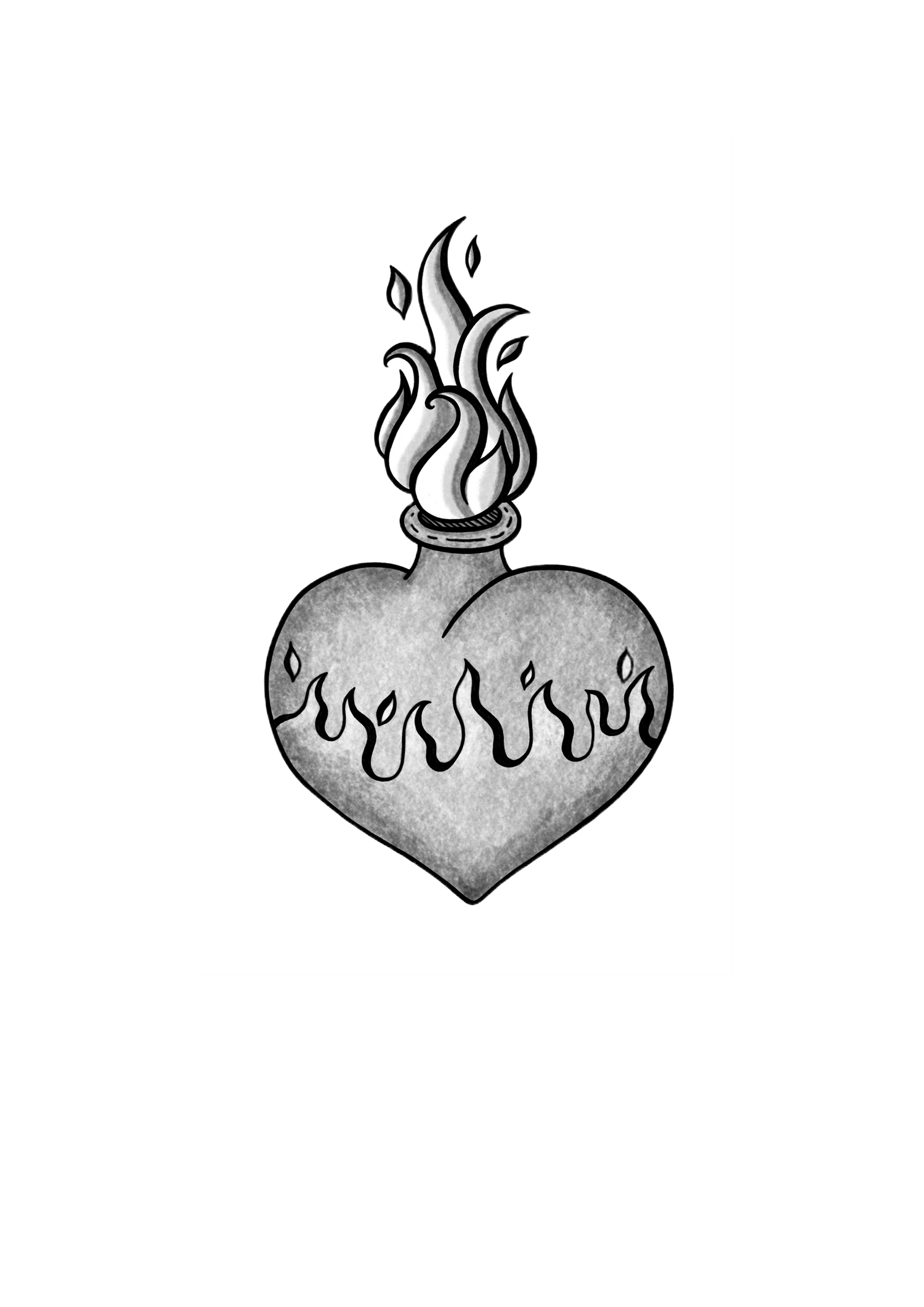Garage Sailing by Sam Rebelein
It drove up to the sale on Columbus. It was wearing a man’s face today, the kind of face made malignant by chewing gum. The kind of face that hides behind sunglasses, not the kind that simply wears them.
This face had a silver earring in one ear.
It drove this face’s truck to the sale on Columbus on a bright clouded day in early June. It smacked its gum as it grumbled the large engine of the black Ford up to the stub of driveway. A middle-aged mother and her buzzheaded dork of a teenage son sat at the head of the driveway. She was reading a book on her pink Kindle. He was on his phone.
It rolled down its window, smacking its gum with a grin. “Heya.”
Mother and son looked up and smiled. “Hi, how’re you?”
“Hey, ya gotta any Hot Wheels?”
Then the wide black barrel appeared over the rim of the open window. Poked its head out into the daylight. Thunk, it launched a grenade up the driveway.
It drove away laughing, smackin its gum, as the mother and son burst in opposite directions behind it. The mother, they’d have to identify by teeth.
It cruised up the Arterial for a ways until it came to the next bright sign. Yellow-green neon, pointing down Milwaukee.
“Ninety-Six Milwaukee Driiiive,” it cranked the wheel as it sang to itself, so it’d remember where it was going. “Ninety-Six, ole Ninety-Six!”
By the time it reached Ninety-Six Milwaukee Drive, the clouds had shifted. The sun was burning a hole through a thin gray sheet that maybe threatened rain.
Ninety-Six Milwaukee Drive had a spindly driveway that wove around to an open garage in the side of the house. Three young kids sold lemonade out of a small plastic stand, at the end of the driveway.
It rolled its window down. Smackin its gum.
“Lemonade?” the tallest child asked.
“Sure ting,” it said. “By the way, ya have any old tools?”
Then thunk went the barrel of the gun.
It drove away laughing, before the moms back in the garage had realized what’d happened.
It cruised for a while (“Ya-da-dum! Da-da-da-dum!”) from neighborhood to neighborhood. It heard sirens wailing over the summer breeze, and one time, “Yuh oh!” a cop car flashed lights behind its truck. It pulled over, gnashing its gum. But the car drove around it, sped away to a pillar of smoke rising in the north.
In its aimless cruising, it’d almost driven back to Richards Ave, where it had exploded a family and a golden retriever that morning.
“Whoopsss,” it said, as it pulled a u-turn on Vero. Halfway through the turn, it saw the big white sign.
“Eleven Seventy-One, Muriel Waayy!” it sang as it turned on its blinker.
*****
A very hunched old woman met it at the door of the estate sale. It had the gun in one leg of its jeans, with the intention of asking, “Ya got any air fresheners?” then lifting its leg to pretend a fart, and boom.
It waited for the opportune moment.
She showed it the curio cabinet filled with millions of tiny ceramic jugs.
“Ohh yes, very nice,” it rasped, grinning and smacking its gum. Eyes swirling around behind its sunglasses.
She showed it the rows of Norman Rockwell paintings, filling both walls of the hall.
“Ohh, very good, yes yes.”
Then she led it into the sunroom—and introduced it to Albert.
It stood in the doorway, eyeing Albert. Smackin its gum.
“Hello,” it said, taken aback. Eyes slowing from their normal twirl to a chameleon-crooked twitching. “How are…ya.”
“Fred got him at a flea market,” the woman explained, wobbling behind it. “I don’t know why anyone would want a…full-size doll man, but…”
Albert was, in fact, a strange item: a life-sized Muppet-rendering of an old bald man. He sat in the maroon chair by the window, drenched in gray sun. He had a mopey puppet grin drooping off his mug. One hand gave a lopsided thumb’s-up. His legs were withered cotton things.
“He’s very handsome,” it said. “Don’t ya agree?”
“Yees, but I don’t think… Joyce?”
Another hunched old woman emerged from the kitchen.
“You’re not selling Alfred, are you?”
“Albert,” the kitchen-woman croaked sharply. “We’re not selling Albert.”
“Well, maybe I didn’t wanna buy him,” it snapped. “Er, it. Maybe I didn’t want to buy…it.”
“He scared the Hell out of me when Fred brought him home,” the kitchen-woman squawked. “He shouldn’t be sold. He should be burned.”
Burned, the word made it wince.
“You think…the stuffed man…oughta be burnnned, eh?” it growled. “Fine.”
It left the house quickly, limping to its truck in the driveway. It leaned against the truck-door, pulled the gun awkwardly from its jeans, “Fffucker.” It swung the gun up and thunked a grenade through the window of the sunroom. The grenade punched a hole through the glass, landed at the kitchen-woman’s feet, then burst.
It grunted into the truck and roared away from the house as screams billowed from inside.
*****
As the sun began to sink, it treated itself to beers at a dive bar up the road. For several minutes, a middle-aged woman eyed it from across the bar.
It ordered her a drink.
It took the woman out behind the bar. It kissed her, and forgot all about old stuffed Albert. It forgot it wasn’t a real man. It forgot it deserved to be burned, apparently.
It was about to leap bodies—ditch the man-face and run around in a lady for a while, for a change of pace—but when it prodded at her with its tongue, she prodded back.
It was so surprised, it instinctually split its face. Allowed the skin to curl down in ribbons as its true face floated up. She didn’t scream. Didn’t tell it that it should be burned. Didn’t make it feel worthless, like the junk people bought at garage sales for a quarter. Didn’t sell it away like mother-it had done, when it was young. When she’d found out it was an it, not a real boy at all. When she’d called it never-human: Just bloody wormy cotton pretending to be my son.
No.
This woman peeled her mask like a banana, revealing the slim gray skin of her true face, too.
It blinked, and laughed. Shook its head in awe. “You’re an it.”
She laughed, too. “I’ve never met someone like me.”
“Same, baby.” It kissed her more, with its real mouth (which it had never used to kiss before), then asked, “Hey, wanna do somethin crazy?”
“Always.”
They got into its truck, and drove to Albert’s house. Sliced through the police tape with her butterfly knife, then pulled Albert’s disemboweled half-corpse from the burnt wreckage of his home. The following afternoon, they propped Albert’s ragged top half in the passenger seat of the black Ford. She sat behind it, sucking on its earring as it drove them from sale to sale. It eyed Albert’s limp thumb’s-up, dangling out the window at its side.
Fuck families.
Violence was how ya made friends.
Albert
“I wrote this one afternoon when my mom and I were having a garage sale this summer. I just found it suddenly ridiculous that we have all these fears about shootings in public places, yet here we are, sitting on our driveway. What makes us think we're safe here? Once I started writing, the voice of the it took over. It was a blast to follow around, but it never told me the exact significance of Albert. I could tell Albert meant something to it, but it didn't want to talk about its past to me any more than it absolutely had to. I think that's fine, and I don't want to pry, but I also worry that makes the story not work in some way? I love that it seems to save Albert, and finds a companion, and drives off into the wind with them, but something doesn't quite click between all those pieces. I think. That said, any more fussing with this story would ruin its magic, so I'm just going to leave it here.”
Sam Rebelein (he/him) lives in Poughkeepsie, NY. His work has appeared in a number of speculative fiction magazines including Bourbon Penn, Coffin Bell Journal, The Dread Machine, and Ellen Datlow’s Best Horror of the Year. He’s still on Twitter @HillaryScruff, and he is a huge fan of garage sales.


